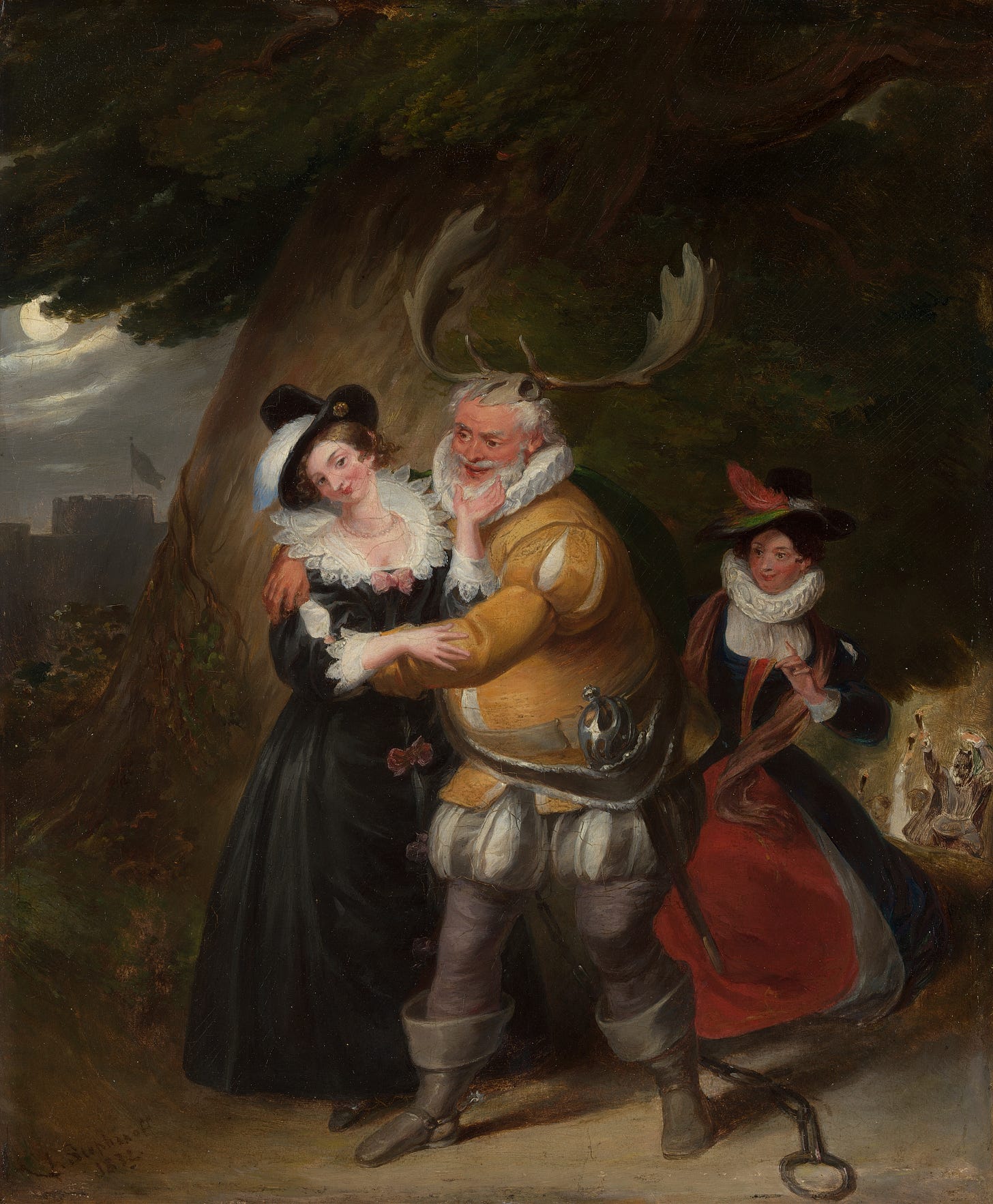
I’m reading through Shakespeare’s plays in an attempt to make sense of the world. Today I’m writing about “The Merry Wives of Windsor.” For a quick reference to posts on previous plays, click here. Next week, “Twelfth Night”.
This week three justices chewed on Hippocrates’ sage advice, “First, do no harm” (“Texas doctors do not need to perform emergency abortions, court rules”, Washington Post, 3 January 2024). They promptly spat it out, complaining it was thin and under-cooked. Harm to whom? they wanted to know. Certainly not (pregnant) women. It would be easy to conclude that women don’t count, legally.
Discounting women is a sucker’s game. After digesting the grim news this week, The Merry Wives of Windsor proved a much-needed tonic.
Summary
This play returns to the stage Falstaff and his mates (Bardolf, Pistol, and Nim), audience favorites who lightened the mood in the Henriad1 plays. Without the somber pageantry of English royals driving the plot, Falstaff’s mad schemes—and their undoing—take center stage.
The play’s two plot lines share the aim of bedding a woman, one more honourably than the other.
Anne Page is a young woman with multiple suitors: one her father prefers (Slender), one her mother prefers (Doctor Caius), and one she herself prefers (Fenton). Slender is the nephew of a Justice; Caius is a French physician; Fenton is simply in love. Anne Page, appeasing her parents, entertains all of their suits.
In the less honourable plot line, Falstaff is angling for two ‘merry’ wives: Mistress Page (mother of Anne) and Mistress Ford, her friend. He sends duplicate letters to each woman, asking for an assignation. Furious with what feels like an assault, the women compare the letters and decide to con him in order to take their vengeance. Through each act of the play, they prank him in successively more audacious scenarios since he proves himself the most gullible of men.
Meanwhile, Master Ford with his friends watches from the sidelines, somewhat fearing being cuckolded, but cheering on the madcap efforts to humiliate Falstaff. Ford joins the games by impersonating a man who seeks Falstaff’s help in getting into Mistress Ford’s bed. Falstaff then uses this man as a cover for his own lascivious schemes, unaware that he’s being used and laughed at on all sides.
The final scheme brings both plots together. The wives stage a scene in the woods, in which Falstaff arrives costumed as a mythic creature with horns (sign of the cuckold), and is beset by a horde of fairy creatures, who are actually the children and servants of the Ford and Page households in disguise. The fairies set about pinching and harassing Falstaff, while the three suitors each steal off with a ‘fairy’ assumed to be Anne Page. Slender and Caius are disappointed to discover they fled with boys; Fenton returns with Anne after having been wed.
Master and Mistress Page, though initially disappointed that Anne chose a mate for herself, quickly come around after hearing Fenton’s defense to his new in-laws:
FENTON You do amaze her. Hear the truth of it. You would have married her, most shamefully, Where there was no proportion held in love. The truth is, she and I, long since contracted, Are now so sure that nothing can dissolve us. Th’offence is holy that she hath committed, And this deceit loses the name of craft, Of disobedience, or unduteous title, Since therein she doth evitate and shun A thousand irreligious cursèd hours Which forcèd marriage would have brought upon her. FORD (to Page and Mistress Page) Stand not amazed. Here is no remedy. In love the heavens themselves do guide the state, Money buys lands, and wives are sold by fate. -Act 5 Scene 5
Page responds fulsomely: “Well, what remedy? Fenton, heaven give thee joy! / What cannot be eschewed must be embraced.” And Mistress Page announces that she’s over it: “Well, I will muse no further. Master Fenton, / Heaven give you many, many merry days!”
Ford closes the play with a saucy joke about his alter-ego cuckolding him, and so the play is done.
Thoughts
Unique amongst Shakespearean comedies, this play is set in England and its characters are firmly middle class. Which is to say, the original audiences would have seen their own world dramatized onstage.
The play is textbook farce, more like Benny Hill or Monty Python than A Midsummer Night’s Dream. Farce grounds its humor in finding the ridiculous in human behavior, but it also trolls characters for how they look or sound. Much fun is made of the way non-English characters speak in the play: the Welsh parson and the French doctor mangle the English language with their broad accents. They’re presumed fair game because they aren’t like ‘us.’
Fortunately, the play’s primary target is decidedly English, a hallmark of self-deprecating English humour. Falstaff is an overstuffed balloon of a man ripe for pricking, which the merry wives delight to do. They have him carried in a basket of soiled linens and thrown in the river. They dress him as a woman and send him out of the house and through the town in this outrageously camp attire. They get him to wear a ridiculous costume with antlers, presumably to mimic a creature from Windsor legend, and set a crowd of children to torment him.
Two key factors make it acceptable to laugh at him: not only is he an irredeemable buffoon, but he’s culpable in bringing shame upon himself. He was the transgressor who attempted to seduce married women and treated them interchangeably as if they had no individual worth. This is his comeuppance. In the end, Mistress Ford invites him to their merry supper, presumably where they’ll continue to laugh at his expense. Will he care? Unlikely, as long as they continue to pour out the drinks for him.
There’s more to comedy than laughs
Despite the antic comedy, the play advocates for female agency. Many (most? all?) women receive unwanted attention, but Mistresses Ford and Page don’t hesitate to humiliate their aggressor repeatedly. While the men in the play dither amongst themselves, the wives dream up schemes and execute them on a moment’s notice. Anne Page indulges her parents, despite loathing the suitors they prefer, while she plans to marry the man she loves. In the end, the play endorses the decisions and actions by these women. The men may think they’re running the joint, but their worlds are ordered by women.
Unlike other weapons, humor can be wielded by those with the least power. Court jesters can mock kings and be paid for their service. Mistress Page recognizes this, when we catch her after reading Falstaff’s epistolary overture:
MISTRESS PAGE
What a Herod of Jewry is this! O, wicked, wicked
world! One that is well-nigh worn to pieces with age,
to show himself a young gallant! What an unweighed
behavior hath this Flemish drunkard picked, i’th’
devil’s name, out of my conversation, that he dares in
this manner assay me? Why, he hath not been thrice
in my company. What should I say to him? I was then
frugal of my mirth, heaven forgive me. Why, I’ll exhibit
a bill in the Parliament for the putting down of men.
O God, that I knew how to be revenged on him! For
revenged I will be, as sure as his guts are made of
puddings.
-Act 2 Scene 1
She and Mistress Ford haven’t the power to make laws; they can’t confront and challenge a grasping man to defend their honor. They can, however, use their feminine domain—washing baskets, women’s clothing, children—against him. All they need is to entice him there, which is child’s play since he has thrust himself into it with his lechery.
As the laughter dies down, consider this: don’t underestimate the twin powers of women and humor. And watch out when they’re combined.
Ellie’s Corner
Ellie was all in after chasing the ball with Dave. She tried to nap with Duck and Ball. Then someone woke her up. Don’t you hate it when that happens?
Thanks for reading,
Henry IV Part I, Henry IV Part II, Henry V







That was funny! And enlightening. The absence of royals gives license to both the players and the audience.